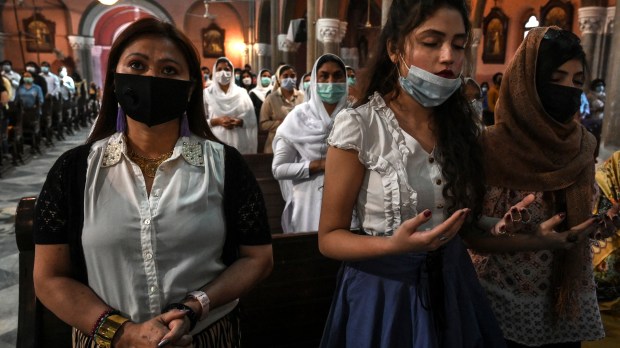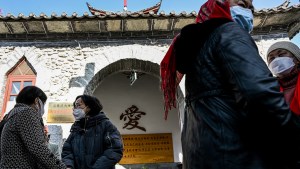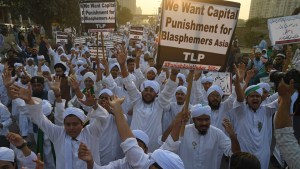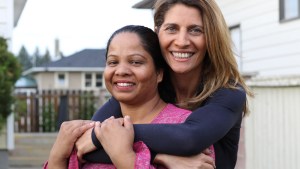American efforts to promote religious freedom in Pakistan have not had much effect, according to leaders of the Justice and Peace Commission of the country’s Catholic bishops.
The United States Commission on International Religious Freedom (USCIRF) in its 2023 annual report recommended that the U.S. State Department once again designate Pakistan as a “Country of Particular Concern,” the worst rating when it comes to violations of religious freedom.
Such actions are “always very good and supportive,” said Bishop Samson Shukardin of Hyderabad, Pakistan, chairman of the National Commission for Justice and Peace, the Pakistan bishops’ social action arm. “But in practical terms, we have not seen any big difference, any big change taking place, and they never consulted with us. We are the ones who are suffering and we are the ones who are working for justice and peace, and they never consulted with us at least to know that we are this justice and peace office.”
Bishop Shukardin and Fr. Emmanuel Yousaf, national director of the Justice and Peace Commission, spoke with Aleteia from the New York offices of Aid to the Church in Need USA, which was hosting the two for a U.S. visit.
Christians account for only 1.6% of Pakistan’s population, Bishop Shukardin said. The Justice and Peace Commission aids Christians wrongly accused under Pakistan’s anti-blasphemy law, as well as girls and young women who were abducted and forcibly converted to Islam.
The pair pointed out that they are not calling for an abolishment of the blasphemy laws, which carry serious penalties for besmirching the name of the Prophet Muhammad or tenets of Islam or desecrating the Quran. But they are calling for reform measures to help prevent abuses of the laws.
“Blasphemy cases are the most dangerous for us because we are always scared about all these — because any two people who could come and stand against us can claim that [someone] has done this or he has said [something blasphemous], whether you have said it or not said it,” the bishop explained. “But you will be caught up in that whole scenario.”
In many cases, baseless charges of blasphemy are brought against someone merely to settle a score. But it’s easy to rile up a mob over such charges, and police, lawyers, judges and local governments seem to be intimidated by such mobs, who often take “justice” in their own hands anyway.
Fr. Yousaf pointed out that every mosque in every little village has an exterior public address system, normally used for the Muslim call to prayer, “so within no time a guy goes on the PA system and announces that so and so, a Christian, has committed blasphemy, and please come. And a big mob comes where it has happened, and in many, many cases they have ransacked the houses, they have burned the houses, they have burned the churches or small chapels in those villages, and also people have to run out of the village. They have to run for their lives with their children.”
Asia Bibi
Fr. Yousaf is still in touch with Asia Bibi, whose case is perhaps the best known example of a blasphemy charge gone wrong. Bibi, an illiterate mother of two who was accused of blasphemy after a dispute with a coworker, spent 10 years in prison, often awaiting a death sentence. Her case illustrated how even courts can be caught between the need to exonerate someone who is innocent and intimidation from radical Muslims. Bibi and many others are left in a legal limbo, often losing many years of their freedom.
“This illiterate lady had to remain in prison for nothing for 10 years,” Fr. Yousaf exclaimed. “I mean, she had not done anything. But at the end of the day, thank God, because of the prayers of our people, and everybody prayed for her in Pakistan – we also had asked the community to fast for one or two days for this especially – when it went into the Supreme Court, thank God, she was released.”
Even so, he said, “the suffering still remains with her. The trauma was so big.”
Forced conversions
In addition to blasphemy cases, the Justice and Peace Commission is worried about cases of forced conversion to Islam and the forced marriages of non-Muslim girls to older Muslim men. In the Province of Sindh, where Bishop Shukardin is, “there are many abduction cases – forced conversions, forced marriages, and that is mostly with the Hindu families, as well as Christian families. What they do is they take girls of 12 years to 16 years and they kidnap them from the school or some houses by force. And in one night they convert them to Islam and they marry her also to old men in their own location. And then they bring them to the house or to the court and tell them that she has accepted Islam by her own self, which is wrong. She has not accepted Islam, because she was pressured so much that she has to say that she has accepted that by her own self because she wanted to save her own family. The free will is not there, actually.”
The bishop said that Pope Francis is “very much conscious about all these issues and he is very helpful and supportive.”
“And the Vatican from time to time has a dialogue with the government through the nunciature” about the problems, he said. “But that is not enough,” he said.
“We would say that the Vatican is not such a powerful [entity] for them. What for them is powerful is those countries who are giving aid to them. They will listen to them because if they will not listen to them they will not receive the aid they need.”
Fr. Emmanuel pointed out that Christians are not asking for special treatment; just fairness.
“We belong to this country. We have not come from outside, so nobody has to be a second class citizen,” he said. “We are very much concerned for our country what is happening nowadays. We love our country. We are ready to support it. … We are not asking for any special favor because we are Christians. We are just asking them to consider us the full citizens, not half citizens, of our country.”




